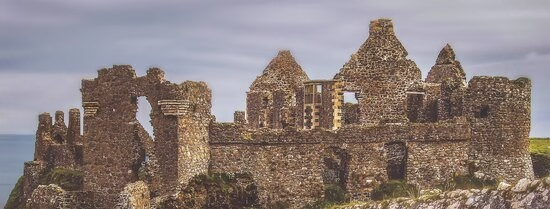Tour guides help opening the conversation about the former conflict in Northern Ireland, shows research of Emily Mannheimer at Erasmus School of History, Culture and Communication (ESHCC). For her dissertation she participated in many tours and held interviews with tour guides. “How to talk about the past is really in the hands of tour guides and that is unique for a post-conflict country.”
When talking about Northern Ireland many people will mention Bloody Sunday and the deadly attacks of the IRA. During the conflict between nationalists and loyalists, tourism declined significantly, but as soon as the peace agreement was signed in 1998 the country started to increase its efforts to attract tourists. The official tourism bodies didn’t want anything to do with what is often referred to as ‘the Troubles’, says researcher Emily Mannheimer. “The government does not want to be accused of picking a side as it is still a very sensitive topic. The focus lies on pre-Troubles industrial heritage or live entertainment and the arts. They would do anything, except promote the conflict.”
Tourists can visit ancient Celtic archeological sites, visit a museum about the Titanic (as it was built in the country), or learn about up-and-coming creative industries. But often tourists are eager to learn about the Troubles. Mannheimer spent two summers in Northern Ireland to participate in many tours and interviewed guides, for example, on how they deal with questions about their more painful chapter in history. “Many people want to know about it, and that is why they visit the country. Often guides will try and change the reputation away from bombs and violence to show that they are so much more than that.”
Dodging questions
Guides handled questions about the Troubles in different ways but many of them struggled with their response, the researcher observed. “As guides, they want to accurately inform their audience, but they don’t want everything to be about the Troubles”, she explains. “Some guides refuse to talk about the conflict and refer tourists to specific tours about the Troubles. Other guides see it as an opportunity to help change the stereotype as portrayed in mainstream media and Hollywood. They want to set the record straight.”
In Belfast, there are many tours about the Troubles, but for a long time, official channels did not advertise them. The most popular tours take you to one of Belfast’s divided neighborhoods. These tours start on the IRA side and are often led by people who were imprisoned for their participation in the conflict. They take the participants to the peace wall that was built between both neighborhoods. From there, a loyalist guide takes over. “How to talk about the past is really in the hands of tour guides and that is unique for a post-conflict country. Usually, it’s governments who take a lead in this. Think of the National Holocaust Museum in Germany.”

No shared narrative
After a conflict, most governments try to establish a shared narrative, but Northern Ireland left it open for local groups. “The government does not actively encourage this, but doesn’t stop it either”, says Mannheimer. Local initiatives can apply for (EU) funding and in the low season, tours are often attended by school groups and therefore reach many people. “Now the government sees that people like the tours and they are starting to promote them.”
Game of Thrones
Tourism in the country got a boost thanks to the hit series Game of Thrones, as most of the show was shot in Northern Ireland. Mannheimer also attended several tours that showed the places where scenes were filmed, but she was surprised to find out that they covered much more. “These tours were just as much about Northern Ireland itself. The guides used it as a way to introduce tourists to lesser-known parts of their heritage and culture. For example, they highlight Northern Ireland’s ancient Celtic history. Guides see it as an opportunity to redefine the image of Northern Ireland.”
- More information
PhD-defense
On Friday, 9 September 2022, Emily Mannheimer will defend her PhD dissertation: ‘Re-imagining a New Northern Ireland: Tourism and social transition after conflict’.
- Related content

